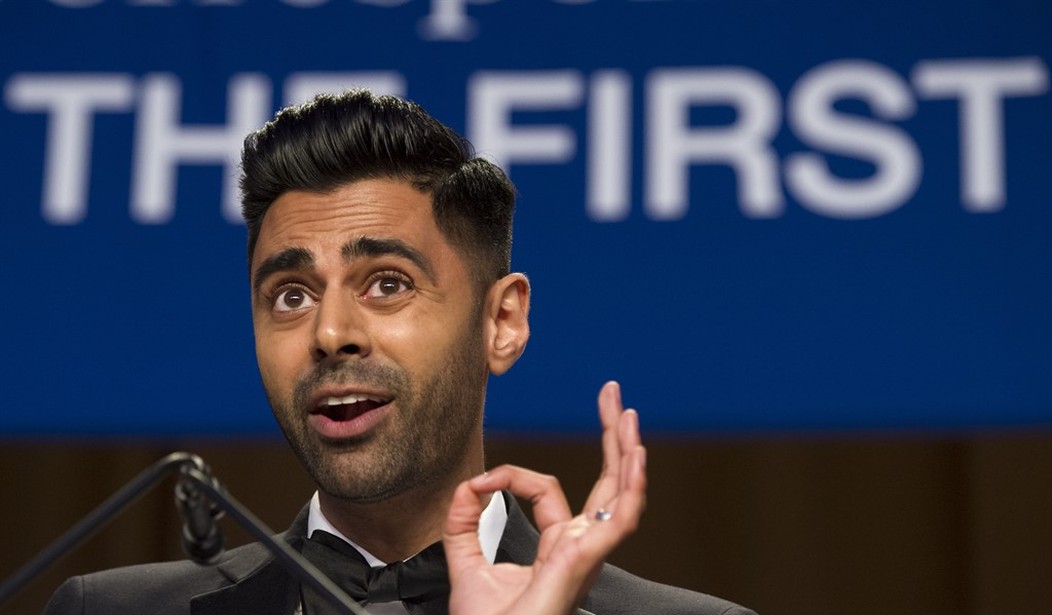Hasan Minhaj is a comedian of some note. The Muslim-Indian American and mildly funny host of the Netflix series “Patriot Act” is deemed “entertaining” by many critics.
Truth be told, I’ve watched very little comedy since it became “unfunny” about 30 years ago. Comedy has become either insufferably political or mind-numbingly boring. And preachy, preachy, preachy. And don’t forget the raunch. Obscenity becomes unfunny through repetition when it loses its ability to shock.
Maybe I’m just too old to “get it.” But the Smothers Brothers were very political — and liberal — and were still able to split my sides after watching them. George Carlin and Cheech and Chong — their politics mattered a lot less than their ability to tell a good joke.
But Minhaj has been harboring a dirty little secret. According to this otherwise glowing profile of Minhaj in The New Yorker, Minhaj’s stories of racism and bigotry are almost all untrue.
In Minhaj’s approach to comedy, he leans heavily on his own experience as an Asian American and Muslim American, telling harrowing stories of law enforcement entrapment and personal threats. For many of his fans, he has become an avatar for the power of representation in entertainment. But, after many weeks of trying, I had been unable to confirm some of the stories that he had told onstage. When we met on a recent afternoon, at a comedy club in the West Village, Minhaj acknowledged, for the first time, that many of the anecdotes he related in his Netflix specials were untrue. Still, he said that he stood by his work. “Every story in my style is built around a seed of truth,” he said. “My comedy Arnold Palmer is seventy per cent emotional truth—this happened—and then thirty per cent hyperbole, exaggeration, fiction.”
“Seed of truth”? “Emotional truth”? Whatever happened to good old-fashioned, 100%, look-me-in-the-eye-and don’t-lie truth?
As the Daily Caller’s Kay Smythe points out, making up stories is part of being a comedian — “I have one friend who talks about his wife all the time in his specials, despite the fact he’s not even married,” relates Smythe.
But Minhaj’s “emotional truths” have nothing to do with reality. They are the perception of a reality that’s been created to tell a story of a hateful America, a bigoted America, a racist America.
Yes, there are haters, bigots, and racists in America. But the stick figure portrait of America Minhaj and other leftists want to paint of America is a political construct and not reality.
Later in the special, Minhaj speaks about the fallout from “Patriot Act” segments on the killing of Jamal Khashoggi and Narendra Modi’s Hindu nationalism. The big screen displays threatening tweets that were sent to Minhaj. Most disturbing, he tells the story of a letter sent to his home which was filled with white powder. The contents accidently spilled onto his young daughter. The child was rushed to the hospital. It turned out not to be anthrax, but it’s a sobering reminder that Minhaj’s comedic actions have real-world consequences. Later that night, his wife, in a fury, told him that she was pregnant with their second child. “ ‘You get to say whatever you want onstage, and we have to live with the consequences,’ ” Minhaj recalls her saying. “ ‘I don’t give a s**t that Time magazine thinks you’re an “influencer.” If you ever put my kids in danger again, I will leave you in a second.’ ”
Does it matter that neither of those things really happened to Minhaj?
How does The New Yorker writer Clare Malone justify Minhaj’s lies?
People don’t necessarily go into standup shows expecting airtight truths. They expect laughs, perhaps some trenchant observation. On John Heilemann’s podcast earlier this year, Minhaj described his work as “the dynamic range that theatre and storytelling and comedy allow you to explore.” Does that mean audiences should expect his words onstage to stringently hew to the facts on the ground? The slipperiness of memoir finds a new dimension when it’s played for laughs in front of a crowd.
So there’s a “new dimension” to truth and there’s a “slipperiness” to it?
If a conservative were to relate a “new dimension” to truth, it’s a lie. But when a liberal talks about an “emotional truth,” we should take it as gospel.










Join the conversation as a VIP Member